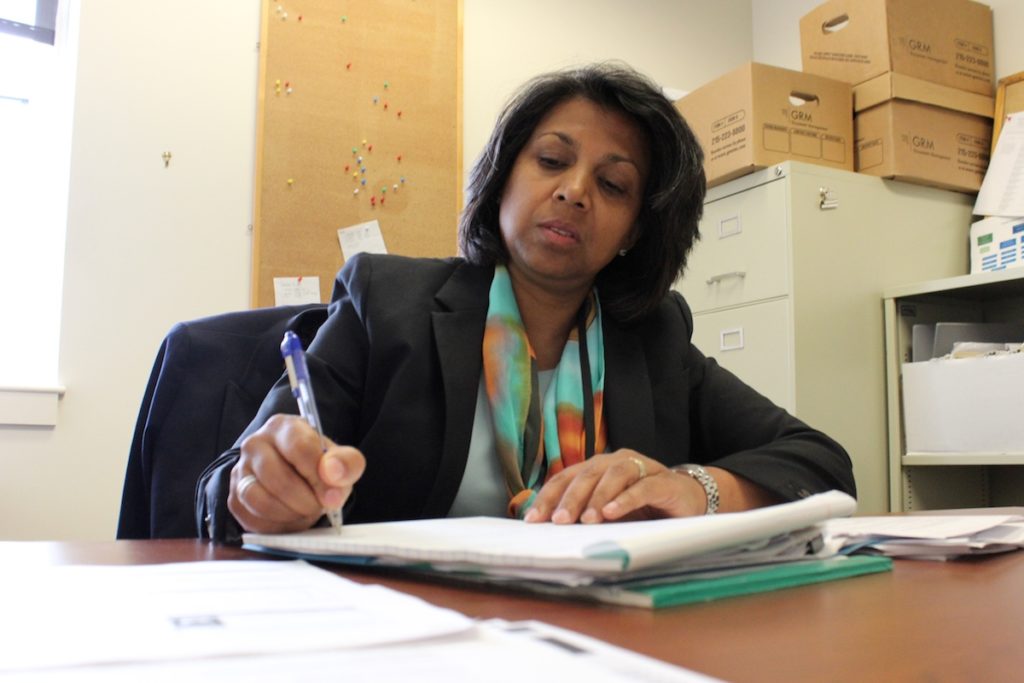Sangeeta Prasad wants to inject more empathy into Philly’s parole and probation systems
 October 8, 2018
Category: Feature, Featured, Long, People
October 8, 2018
Category: Feature, Featured, Long, People
It’s been described as America’s mean season, the punitive years starting in the 1970s that saw the ballooning of the number of people — primarily men of color — imprisoned, often for nonviolent offenses in jails that increasingly deemphasized rehabilitation and reintegration into society.
By the 1990s, America was incarcerating more people per capita than any other developed nation. And with mass incarceration came its less famous relatives: mass parole and probation. A staggering one out of every 53 adults in America are under community supervision.
“Folks kept on probation is just punitive,” sighed Sangeeta Prasad, who is working with Philadelphia’s Office of the District Attorney as one of the Stoneleigh Foundation’s newest multi-year fellows — not to be confused with Stoneleigh’s Emerging Leader Fellowship — who are selected for their established leadership skills and charged with transforming systems that serve vulnerable youth.
(Prasad is in alarmingly good company: Stoneleigh Fellow Raj Jayadev was just named a 2018 MacArthur Fellow.)
During her three-year fellowship, Prasad hopes to help DA Larry Krasner and other stakeholders put a dent in the number of people on probation up to age 26 by revising practices and standards, which Krasner has named as goals for the office.
For Prasad, a combination of latest neurocognitive science research and her own experiences, especially as an assistant public defender in the mid-90s, was an impetus to reevaluating the parole and probation system. “Where did the fire in the belly come from for juvenile probation?” she said. “When I was a public defender I didn’t know the data and now I wonder if we can do better.”
“Brain research,” Prasad added, “says that the ages 0 to 4 and 14 to 25 are periods of great brain development and they are periods when people are more responsive to experiences. Negative experiences have a broader and deeper impact but also showing trust and recognizing success and good behavior can also have a broader and deeper impact.”
Prasad, also an adjunct professor at the University of Pennsylvania Law School, is more comfortable talking about her work than herself, but she did share that when she was growing up, her family wasn’t keen on the legal profession and lawyers were often on the wrong end of family jokes. But for the University of Maryland School of Law graduate, the law represented an opportunity to practice empathy.
Probation is a court-ordered period of correctional supervision in the community, generally as an alternative to incarceration, while parole is a period of conditional supervised release in the community following a prison term.
Both had their origins in empathy: It was part of a reform effort to keep communities safe by using prosocial methods to reintegrate prisoners into the community.
In the decades of mass incarceration, parole and probation is more about punishment than rehabilitation with methods such as intensive supervision, drug testing and electronic monitoring becoming the norm. The problem is as researchers looked more closely at the results, they discovered that it didn’t make communities any safer.
Prasad said about 40,000 Philadelphians of all ages are now on probation or parole — compared with New York City, which is more than five times larger in population than Philadelphia, but only has 12,700 people on probation or parole.
According to the Urban Institute, mandatory parolees, which make up the largest share of released prisoners, “fare no better under supervision than similar prisoners released without oversight by a parole officer.”
Increasing numbers of states are rethinking probation and parole but, Prasad sighed again, “Pennsylvania is not one of those states.” Instead, one in every 22 adults is on probation or parole.
State Senator Anthony Hardy Williams has taken up the mantle and introduced legislation to “cap the length of probation sentences; limit a judge’s ability to jail parolees and probationers for technical violations that do not threaten public safety; incentivize good behavior and allow judges to reduce probation or parole time; and limit the terms of probation to the original sentence.”
Prasad chuckles when asked how she’ll keep from being dismissed as a bleeding-heart liberal in a law-and-order town.
“We will save a ton of money,” she said. “People who are over-supervised are more likely to reoffend. So, we can use the money we save by not locking people up for other priorities. It makes fiscal sense, too.”
Trending News









